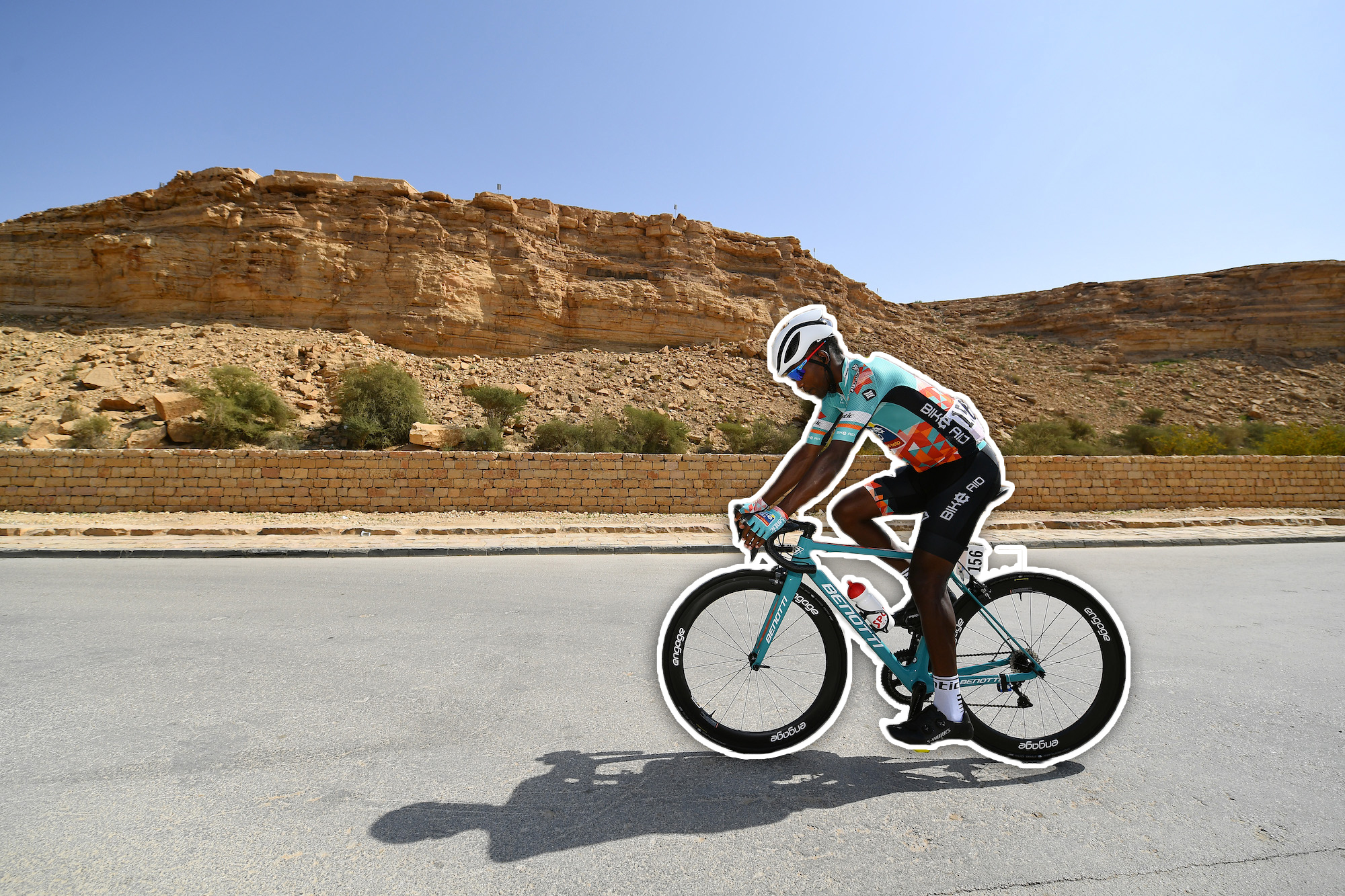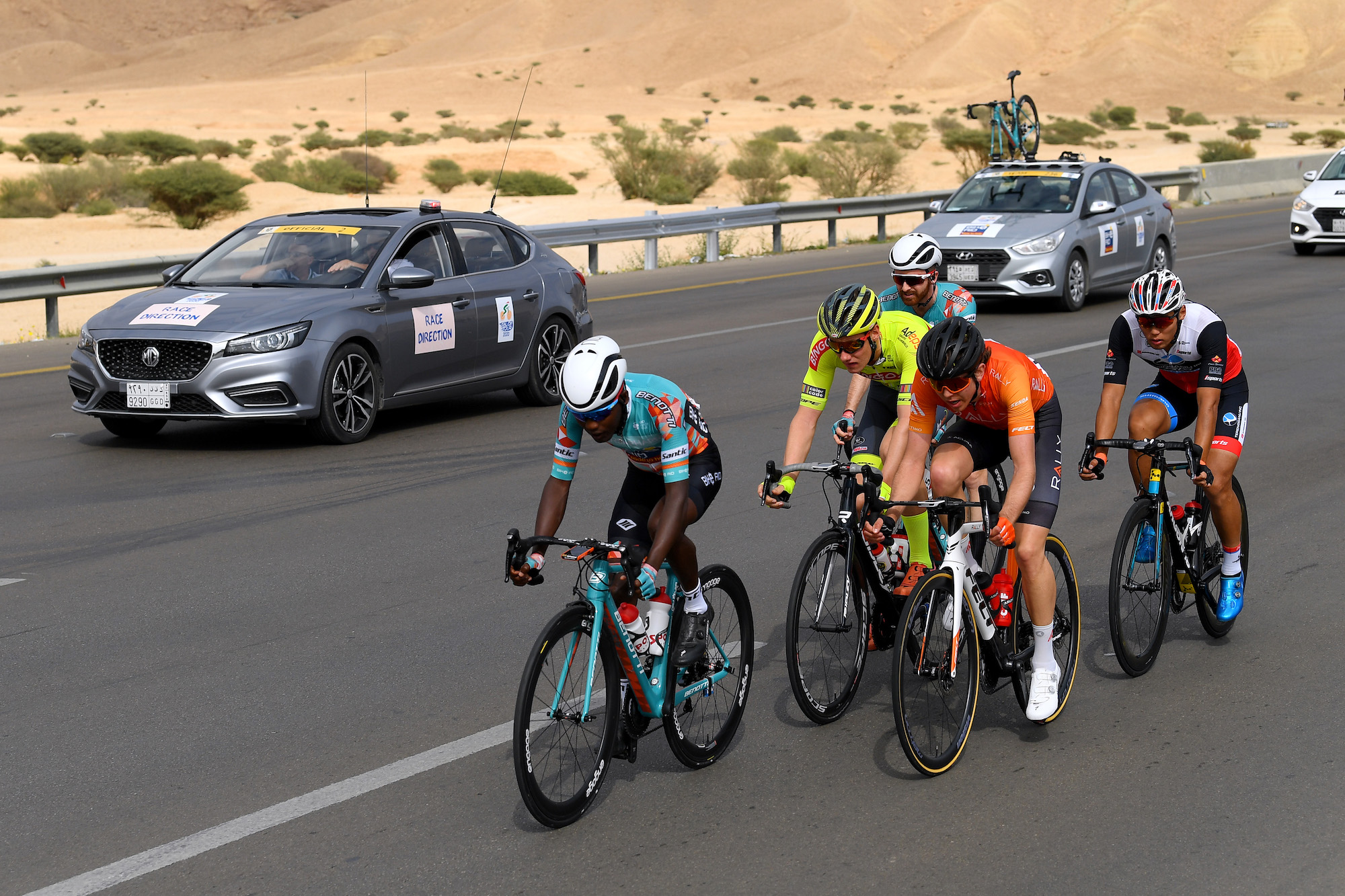'If the WorldTour stopped tomorrow, the social impact is zero': Bike Aid are one team trying to change that
Team boss Timo Schäfer made this prediction weeks before the coronavirus pandemic wiped the racing calendar clean - his cycling team stands for something more than just winning bike races

Suleiman Kangangi at the 2020 Saudi Tour (Photo by Stuart Franklin/Getty Images)
Back in February 2020, which feels like a million years ago but in actual fact was only 14 months, I was in a nondescript car park in Saudi Arabia, chatting to Timo Schäfer, the team manager of Bike Aid, a German Continental team.
He said: "If you stop the whole WorldTour tomorrow, the impact is zero in social terms, it's just zero. There's nothing, no one would even recognise it was gone. Well, some people would say it's a pity, but there is no real social impact."
While we had both arrived at Riyadh airport to be greeted by the sight of people wearing face masks, the coronavirus pandemic was yet to touch Europe, and unbeknownst to us at the time, in just a few short weeks we would be able to see if his prediction was correct as the cycling calendar was wiped clean.
Although all cycling fans missed racing terribly during that six-month period of 2020, Schäfer is right. Really, it was only a pity. Of course, for those directly involved in the industry, there were worries over jobs. But who wasn't? The message from riders during those months, especially in reaction to big races being cancelled, was that there were bigger concerns in the world at present. And although the worst of the pandemic is hopefully now over, other social and humanitarian issues always remain.
The reason for Schäfer's strong opinion on the matter is the raison d'être of Bike Aid. Their primary focus isn't necessarily on winning bike races, and anyway, that would be a weird endeavour for a road cycling offshoot of what is largely a German cycling club numbering 1,400 members, 90 per cent of whom ride mountain bikes.
Membership of traditional cycling clubs in Germany has been decreasing for a number of years following doping scandals, Schäfer says, and so a fresh approach was needed, everything had to be different.
The latest race content, interviews, features, reviews and expert buying guides, direct to your inbox!
"We have, let's say, a difficult past in Germany with cycling," Schäfer says. "All sponsors withdrew from cycling, the reasons are well known, and we see that the structures in cycling, they haven't really changed. All the people involved in all those affairs in the 90s, and 2000s, are still there. And we say we don't want to be in touch with that.
"I don't want to discuss or judge if it's good or wrong, just for us, it's not our way to go. And it's for sure not the way that the people in Germany would accept. So for us, the most important thing is to have social relevance."
Since 2006, Bike Aid has raised more than €850,000 for charitable causes, ranging from helping children with cancer and their families to funding school projects and orphanages in Africa. At the Tour of Rwanda 2020, they opened the Bike Aid school just outside the capital city of Kigali.
"No one would even notice it," Schäfer says, returning to the prospect of the WorldTour disappearing overnight. "It's hard to say but if we stopped tomorrow, our team, it would have a social impact in Africa. Because we have already changed lives. And I think this is what it's all about."
The photo above is proof of the gulf between what Bike Aid is trying to achieve and charitable initiatives supported by a lot of other teams.
"So we don't want just to have a selfish kind of team where people do sport just for themselves. But we rather want to install and implement a system where we make a social impact and encourage young people to start cycling and to have role models that show a way out of poverty. Suleiman is a perfect example, that's what we want to do."
Suleiman Kangangi has been racing for Bike Aid since 2017, but as a young child growing up near the Olympic-champion factory of Iten, Kenya, his mother loaned him to a cattle owner in order to earn money for the family, $8 a month. When he was 12 years old, tribal clashes came to his village, he left school and never returned.
"My upbringing was quite hard, just like a lot of children in Kenya," Kangangi tells Cycling Weekly. "I didn't get a very good education but not because I didn't want to, but just because the family couldn't afford it. It was a hard upbringing, and I appreciate where I'm at the moment, but yeah, it was quite hard in the beginning."
While working as a milk vendor at the age 0f 14, he saw his very first bike race, a local affair, which first piqued his interest in the sport. Then, in his early twenties, Nicholas Leong arrived in Iten, wondering whether the town that created champion runners could also one day produce world-beating cyclists. Just how Lizzie Deignan was discovered cycling around her playground by British Cycling, Leong was testing out young boys with potential, and Kangangi made his first steps into cycling via Kenyan Riders.
"It was pretty exciting but it was hard as well, in Kenya, there were a lot more talented people than me and sometimes you question yourself if you can make it, but you just have to keep going," Kangangi says. "I managed to pull through and not give up and I can be proud at the moment that I'm here.
"Maybe I'm not the most talented rider, but I guess Kenyan Riders gave me a job, and a purpose in life. It's been a journey to prove I belong in professional cycling."

The 38-year-old goes on to talk about his experiences racing, the craziest thing he's experienced being crosswinds during a race in China (apparently you never find crosswinds in Africa) and the Tour of Rwanda being the favourite race of his career so far, seeing African roads packed with cheering fans.
Kangangi's story is an inspiring one, and even the fact he's a Chelsea fan can't take the shine off his tale, but while the number and organisation of African races of the years has steadily improved, the issue of visas is one that continues to kneecap African riders dreaming of racing in Europe.
"African riders really have challenges with visas and it can be quite annoying, but it's out of the riders' hands, it's something that I hope maybe in the future can change," Kangangi says.
Races in Europe will sometimes not offer an invitation to a team until the last minute, one or two weeks beforehand, which is rarely enough time for an African rider.
"You have to go to the embassy, the embassy has to take 14 days, it takes time, and then you miss that race. So for the owners of teams, that can be a bit harder if you have a rider and have these problems, then it is not so comfortable," Kangangi says. "Even if you want to help that African rider, you prefer to get another European, whatever rider from somewhere else that doesn't have these issues. And that, you know, doesn't help.
"Maybe the bigger people, the big organisations can help. ASO is very strong, the UCI could maybe create some rules that can help African riders to make it a bit easier to for them to enter into the races, especially in Europe."
Kangangi is now 32 years old, and while at the Saudi Tour in 2020 he was up the road in the breakaway more often than he wasn't, his racing days will likely be behind him before too long.
"We're developing him more to be the teacher, the role model for the next generation because it's super important to have someone from the country speaking the language, who can inspire and teach the young people," Schäfer says. "Let's say...generation one is Suleiman. And then we hope generation two or three is growing."
Even before the coronavirus pandemic, 2019 was a difficult year for Bike Aid, a financial backer pulling out just before Christmas 2018, and although their ambitions are bigger than what happens between the start and finish of a bike race, they are, of course, still a cycling team.
"I mean, of course, we have ambitions," Schäfer says. "We are now at the Continental level where we can't go any further, we've done almost all the races that are possible to do as a Continental team. We've done the Tour of the Alps, Tour of Germany, we are present at many HC races, we've continuously been at the Route d'Occitanie in France, which is a very high-level race.
"There is no more development as a Continental team, so we're working on plans to go the next step because this is also the next step to tell our story to spread our story across around the globe. If you are at the start of, let's say, Paris-Roubaix and all the international media are there they'll pick up our story because our story is different. It's at least a story.
"All the other teams, they have no story. So it's a random team, which has the name of a sponsor, which has some guys who are racing, but that's it. Okay, there is the story of who's the fastest? But there's no content behind it, what does it tell? Okay, today we won the race. Great. Tomorrow there's another one."
When you take a step back, it's hard to argue with Schäfer. Outside of personal gratification and enjoyment of cycling, surely endeavours into which so much time and money are poured should have more to show for it?
More convincingly, have a look across the current WorldTour title sponsors and any semblance of moral purity is held in the hands of cement manufacturers and German showerheads. Of course, since our conversation, Team NTT has become Qhubeka-Assos, and standalone as the only WT outfit with a charity in their name.
One thing's for sure, neither the peloton nor the world would suffer from having more Bike Aids in it.
Jonny was Cycling Weekly's Weekend Editor until 2022.
I like writing offbeat features and eating too much bread when working out on the road at bike races.
Before joining Cycling Weekly I worked at The Tab and I've also written for Vice, Time Out, and worked freelance for The Telegraph (I know, but I needed the money at the time so let me live).
I also worked for ITV Cycling between 2011-2018 on their Tour de France and Vuelta a España coverage. Sometimes I'd be helping the producers make the programme and other times I'd be getting the lunches. Just in case you were wondering - Phil Liggett and Paul Sherwen had the same ham sandwich every day, it was great.